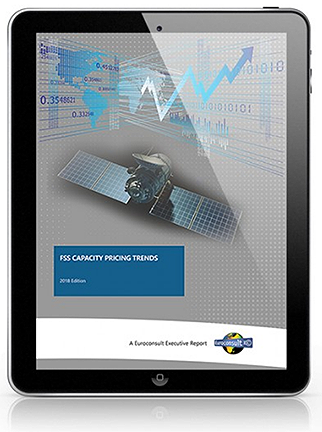
According to Euroconsult's latest report, FSS Capacity Pricing Trends, the combination of oversupply from the addition of traditional satellite capacity in certain areas along with the unrelenting rollouts of HTS capacity has resulted in new pricing references in most geographies and market segments across the FSS sector.

While data-oriented markets have been the most exposed, with double-digit capacity pricing declines over the last 2-3 years, video applications have also been impacted. Other factors have included consolidation among service companies in certain segments, resulting in larger capacity buyers with more bargaining power, and heightened competition from a growing pool of national satellite operators. Built upon the collection of nearly 200 price points over the last 18 months, Euroconsult's capacity pricing assessment focuses on price dynamics in terms of regions, frequency bands and verticals, providing both ranges and reference pricing levels.
Concerning short-term trends, Euroconsult considers that overall pricing conditions tend to stabilize with several important considerations:
- While the overall "pricing grid" would stabilize, the new prices would spread and be applied to an increasing number of capacity contracts. This will include a convergence between the pricing applicable for traditional and HTS capacity in a given frequency band, even if some differentiation remains applicable. The main differentiation will continue to be for video customers eager to benefit from the broadcast capability of traditional satellite systems.
- Prices for HTS capacity tend to create a new reference even in areas where such capacity is not yet available, due to the efforts of operators to pre-sell their capacity, while larger contracts volumes have also supported downwards pressure on average pricing levels.
- As a result, the market could see a continuous erosion in the average revenue per capacity unit being sold (ARPU), even if (spot) pricing partly stabilizes. In the longer term, the availability of VHTS systems, with capacity in the range of several hundred Gbps of capacity supply to 1 Tbps, and of NGSO constellations will likely have a new impact on pricing, defining new reference rates. Still, such systems would only cause progressive impacts as most systems would be deployed after 2020.
Pacôme Révillon, CEO of Euroconsult, noted that while prices lower than $1,000/MHz/month have been reported, even for traditional (regular) capacity, in some geographies or use cases, prices of up to $7,000 can still be found. Still, reference regular capacity pricing has now fallen below $2,500 for data applications in nearly all regions, while pricing for HTS capacity primarily stands between $100-$500/Mbps/month, with the exception of certain premium services.
FSS Capacity Pricing Trends provides an assessment of current dynamics for the pricing of satellite capacity, in a context of sustained technology innovation and additional satellite capacity associated with new generation satellites. The report includes coverage of nine regional markets, together with a specific review of the mobility and government vertical markets.

